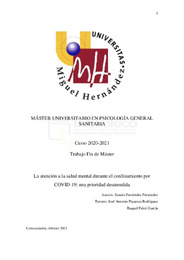Por favor, use este identificador para citar o enlazar este ítem:
https://hdl.handle.net/11000/26622Registro completo de metadatos
| Campo DC | Valor | Lengua/Idioma |
|---|---|---|
| dc.contributor.advisor | Piqueras Rodríguez, José Antonio | - |
| dc.contributor.advisor | Falcó García, Raquel | - |
| dc.contributor.author | Fernández Fernández, Sandra | - |
| dc.contributor.other | Departamentos de la UMH::Psicología de la Salud | es_ES |
| dc.date.accessioned | 2022-04-26T11:25:33Z | - |
| dc.date.available | 2022-04-26T11:25:33Z | - |
| dc.date.created | 2021-01-26 | - |
| dc.identifier.uri | http://hdl.handle.net/11000/26622 | - |
| dc.description.abstract | La COVID-19 ha ejercido un fuerte impacto emocional, socioeconómico, conductual y de cambio de prioridades para toda la población. Una de las consecuencias del confinamiento fue la interrupción de muchas terapias psicológicas y la imposibilidad de recibir asistencia psicológica de forma presencial. Por ello, el objetivo del estudio fue examinar cómo se asocian determinados factores de protección (resiliencia), y de riesgo (grado de interferencia del Covid-19 y confinamiento y miedo al Covid-19), así como el nivel de salud mental bidimensional, con la presencia de problemas ocasionados por la pandemia y el confinamiento y el hecho de recibir o no terapia. Para ello, se contó con una muestra de 599 sujetos que cumplimentaron online, en los meses de abril a julio, cuestiones relacionadas con; el grado de interferencia y el miedo al COVID-19, sintomatología ansiosa y depresiva, resiliencia, estrés agudo y bienestar general, así como cuestiones relacionadas con recibir o no apoyo psicológico y, la presencia de problemas emocionales ocasionados por el confinamiento y la pandemia. Los resultados indicaron peor salud mental general, y menor grado de resiliencia y bienestar subjetivo en el grupo que recibía terapia, seguido del grupo que no recibía, a pesar de reportar problemas y, por último, el grupo que ni recibe terapia ni reporta tener problemas. Además, se encontró que el grupo que reporta problemas, pero no recibe terapia presenta problemas similares al grupo que sí cuenta con este apoyo. Estos resultados señalan la importancia y necesidad de garantizar asistencia psicológica durante una pandemia como esta. | es_ES |
| dc.description.abstract | Covid-19 has had a strong emotional, socioeconomic, behavioural, and priority-shifting impact on the entire population. One of the consequences of confinement was the interruption of many psychological therapies and the impossibility of receiving psychological assistance on regular basis in person. Therefore, the aim of the current study was to examine how certain protective factors (resilience) and risk factors (degree of interference of Covid-19 and confinement and fear of it), as well as the level of two-dimensional mental health, are associated with the presence or absence of problems caused by the pandemic and, the fact of receiving therapy or not. To accomplish this, a sample of 599 people completed, from April to July, an online questionnaire with different scales related to; the degree of interference and fear of Covid-19, anxiety and depressive symptoms, stress, resilience, and general well-being, as well as questions related to attending o not to therapy and presence or absence of emotional problems caused by confinement and the pandemic. The result indicated poorer general mental health, and lower degree of resilience and well-being in the group that received therapy, followed by the group that did not attend, despite reporting problems and, finally the group that neither attended to therapy nor reported problems. In addition, it was found that the group that reports problems, but not attends therapy, presents similar problems to the group that attends therapy. These results indicate the importance and need to ensure therapy during a pandemic like this one. | es_ES |
| dc.format | application/pdf | es_ES |
| dc.format.extent | 38 | es_ES |
| dc.language.iso | spa | es_ES |
| dc.publisher | Universidad Miguel Hernández de Elche | es_ES |
| dc.rights | info:eu-repo/semantics/openAccess | es_ES |
| dc.rights | Attribution-NonCommercial-NoDerivatives 4.0 Internacional | * |
| dc.rights.uri | http://creativecommons.org/licenses/by-nc-nd/4.0/ | * |
| dc.subject | Covid-19 | es_ES |
| dc.subject | pandemia | es_ES |
| dc.subject | ansiedad | es_ES |
| dc.subject | estrés | es_ES |
| dc.subject | salud mental | es_ES |
| dc.subject | depresión | es_ES |
| dc.subject | terapia | es_ES |
| dc.subject.other | CDU::1 - Filosofía y psicología::159.9 - Psicología | es_ES |
| dc.title | La atención a la salud mental durante el confinamiento por COVID-19: una prioridad desatendida | es_ES |
| dc.type | info:eu-repo/semantics/masterThesis | es_ES |

Ver/Abrir:
FERNANDEZ Sandra TFM.pdf
1,05 MB
Adobe PDF
Compartir:
 La licencia se describe como: Atribución-NonComercial-NoDerivada 4.0 Internacional.
La licencia se describe como: Atribución-NonComercial-NoDerivada 4.0 Internacional.
.png)